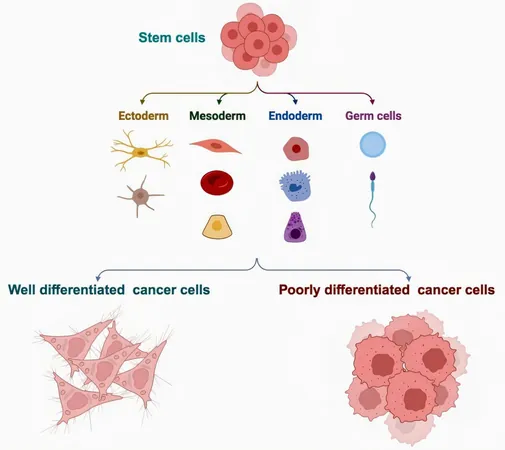
Revolutionary AI and Nanotech Breakthrough: Early Detection of Oral Cancer!
2025-04-14
Author: Wei Ling
Transforming Cancer Detection with Cutting-Edge Technology
A groundbreaking study from the University of Otago has unveiled the incredible potential of combining artificial intelligence (AI) with nanotechnology to detect oral cancer at an unprecedented early stage. Published in ACS Nano, this research showcases a game-changing approach to cancer diagnostics that could save countless lives.
Nano Meets AI: A Diagnostic Revolution
Researchers from the Faculty of Dentistry used advanced atomic force microscopy (AFM) coupled with AI algorithms to identify minute changes in cancer cells that would typically elude traditional screening methods. Senior author, Associate Professor Peter Mei, describes this innovative technique as a major leap forward in cancer detection.
"By merging these technologies, we can identify nanoscale alterations on cancer cell surfaces, enhancing diagnostic accuracy and reliability," Mei explains. "Earlier detection is critical, as it significantly improves patient outcomes and supports the advancement of precision medicine."
The Urgent Need for Enhanced Detection
According to the World Cancer Research Fund, there were nearly 390,000 new cases of mouth and oral cancer around the globe in 2022, leading to over 188,000 deaths. The lead author of the study, Dr. Simon Guan, envisions a future where this diagnostic method becomes a staple in clinical settings, enabling quicker and more accurate cancer diagnoses.
"Our goal is to refine AFM technology for routine clinical use, potentially revolutionizing the detection of various cancers and opening up better treatment options for patients," Guan states.
A New Era of Cancer Therapy?
In addition to improving diagnostics, the findings could herald a new era in cancer treatment based on the unique nano-physical properties of cancer cells. Associate Professor Mei emphasizes the study's significance in fostering innovation and collaboration across disciplines such as dentistry, nanoscience, and AI.
"This research showcases how the integration of diverse expertise can lead to revolutionary discoveries that enhance health outcomes on a global scale."
Conclusion: A Brighter Future for Cancer Detection
This remarkable study shines a light on the power of innovation in healthcare, particularly in the fight against cancer. As researchers continue to refine these technologies, the prospect of more effective, early-stage cancer detection and treatment becomes increasingly attainable, bringing hope to patients and their families.



 Brasil (PT)
Brasil (PT)
 Canada (EN)
Canada (EN)
 Chile (ES)
Chile (ES)
 Česko (CS)
Česko (CS)
 대한민국 (KO)
대한민국 (KO)
 España (ES)
España (ES)
 France (FR)
France (FR)
 Hong Kong (EN)
Hong Kong (EN)
 Italia (IT)
Italia (IT)
 日本 (JA)
日本 (JA)
 Magyarország (HU)
Magyarország (HU)
 Norge (NO)
Norge (NO)
 Polska (PL)
Polska (PL)
 Schweiz (DE)
Schweiz (DE)
 Singapore (EN)
Singapore (EN)
 Sverige (SV)
Sverige (SV)
 Suomi (FI)
Suomi (FI)
 Türkiye (TR)
Türkiye (TR)
 الإمارات العربية المتحدة (AR)
الإمارات العربية المتحدة (AR)